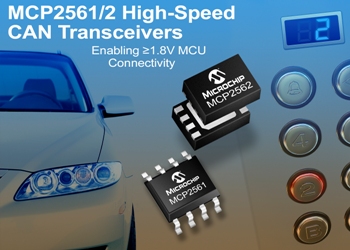Microchip Technology Inc., a leading provider of microcontroller, mixed-signal, analog and Flash-IP solutions, today announced a new family of High-Speed (HS) CAN transceivers, the MCP2561/2. These new devices serve as an interface between a CAN protocol controller and the physical two-wire CAN bus.
 MCP2561/2 Transceivers
MCP2561/2 Transceivers
The new family of transceivers meet CAN specification requirement “GIFT ICT Group Conformance Test Specification V1.0” as verified by C&S Group GmbH in addition to other global automotive Electromagnetic Compatibility (EMC) requirements such as “Hardware Requirements for LIN, CAN and FlexRay™ Interfaces in Automotive Applications,” Version 1.3, May 2012 as verified by IBEE. Customers can have confidence in CAN conformance and high robustness increasing ease of development and system reliability.
The new family of MCP2561/2 transceivers provides two device options. The MCP2561 is an HS CAN transceiver in an 8-pin package and features a SPLIT pin. The SPLIT pin helps to stabilize common mode in biased split termination schemes. The MCP2562 is also an HS CAN transceiver available in an 8-pin package and features a Vio pin. The Vio pin can be tied to a secondary supply in order to internally level shift the CAN transceiver digital I/Os for easy microcontroller interfacing. This is beneficial when a system is using a microcontroller at a Vdd less than 5V (for example, 1.8V or 3.3V) and eliminates the need for an external level translator decreasing system costs and complexities.
The transceivers have an industry low standby current consumption (<5 µA typical) helping meet automotive Electronic Control Unit (ECU) low-power budget requirements. Both parts are also available in 8-lead PDIP, SOIC and 3x3 mm DFN (leadless) package types allowing for development flexibility and offering alternatives for space limited application boards. Additionally, the devices support both Extended (E): −40°C to +125°C and High (H): −40°C to +150°C temperature ranges providing customers the ability to use one part across various CAN connected applications.
The MCP2561/2 CAN transceivers are well suited for a wide range of applications in the automotive market including power train, body and convenience, diagnostics, safety and security and the industrial market, including manufacturing, construction and agriculture, among others.
“The automotive and industrial CAN markets continue to demand higher performance, lower power consumption, more flexibility all in a cost effective solution,” said Bryan J. Liddiard, marketing vice president of Microchip’s Analog and Interface Products Division. “Microchip’s new family of CAN transceivers meets global EMC requirements with up to 14kV ESD performance, offers an industry low standby current, and is available in small form factor device options. Combining PIC® microcontroller, analog and connectivity portfolios, Microchip can help solve customers’ problems and provide complete solutions.”
Pricing & Availability
The MCP2561 transceivers are available now for sampling and volume production in 8-pin PDIP, SOIC, DFN 3 mm x 3 mm packages starting at $0.63 each, in 10,000-unit quantities. The MCP2562 transceivers are available now for sampling and volume production in 8-pin PDIP, SOIC, DFN 3 mm x 3 mm packages starting at $0.63 each, in 10,000-unit quantities.
For additional information, contact any Microchip sales representative or authorized worldwide distributor, or visit Microchip’s Web site at http://www.microchip.com/get/2REU. To purchase products mentioned in this press release, go to microchipDIRECT or contact one of Microchip’s authorized distribution partners.